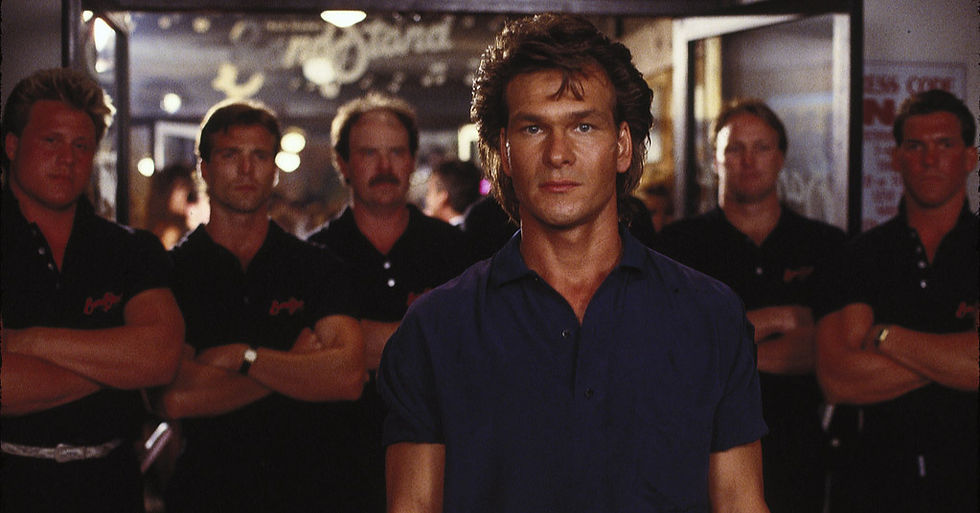Road House (1989)
- Soames Inscker

- May 19, 2025
- 4 min read
Updated: Jun 8, 2025

“Pain don’t hurt”—and neither does watching this movie.
Introduction
When it comes to over-the-top '80s action cinema, Road House is in a category all its own. Equal parts barroom brawler, western pastiche, macho soap opera, and pop-philosophical fever dream, it defies easy classification. Released in 1989, Road House was critically panned at the time but has since become a cult classic, beloved for its absurdly entertaining fusion of violence, melodrama, and Zen-like musings on life and morality—all delivered by the effortlessly charismatic Patrick Swayze.
Plot Summary
Patrick Swayze stars as James Dalton, a philosophical "cooler" (a specialized, elite bouncer) with a mysterious past and a degree in philosophy from NYU. He’s hired to clean up the Double Deuce, a rowdy bar in Jasper, Missouri, that’s infested with violent patrons, drug dealing, and general lawlessness.
Dalton arrives with a quiet intensity, enforcing a strict code of conduct—summed up in his now-legendary dictum: “Be nice… until it’s time to not be nice.” But his attempts to restore order are met with resistance from the town’s corrupt overlord, Brad Wesley (played with gleeful menace by Ben Gazzara), who runs the town with iron fists and henchmen.
As Dalton falls for local doctor Elizabeth “Doc” Clay (Kelly Lynch), he also reconnects with his older mentor, Wade Garrett (the ever-gravelly Sam Elliott). But the conflict with Wesley escalates from broken bones to all-out war, culminating in a climactic showdown that blends kung-fu, gunfights, and moral reckoning.
Performance Highlights

Patrick Swayze as Dalton
Fresh off the success of Dirty Dancing, Swayze brings a smouldering, martial-arts-infused charisma to Dalton. He’s a strange mix of Buddha and Bruce Lee, spouting philosophical aphorisms while roundhouse-kicking thugs through tables. Swayze somehow balances the absurdity with genuine heart, creating a character that feels oddly iconic.
Sam Elliott as Wade Garrett
As the weathered, world-weary mentor, Elliott injects the film with gravitas and wry humour. His chemistry with Swayze is magnetic, and his presence elevates the film’s emotional stakes when the violence turns personal.
Ben Gazzara as Brad Wesley
Gazzara brings theatrical glee to the villain role. Whether he’s driving his car through a dealership window or boasting about his influence over the town, he plays Wesley with campy but chilling charm.
Kelly Lynch as Doc
Though somewhat underwritten, Lynch delivers a solid performance, offering a grounded foil to the testosterone-fuelled madness around her.
Direction and Style

Director Rowdy Herrington creates a hyper-stylized world where bouncers are philosophers, bars are battlegrounds, and the line between good and evil is drawn with fists. The film oscillates between high camp and gritty violence, sometimes in the same scene. The tone is uneven, but never dull.
The fight choreography is brutal, balletic, and hilariously over-the-top. Bones snap, glasses shatter, and throats are literally ripped out (in one of the film’s most infamous scenes). Yet in between the action, there are surreal detours into meditative calm, set against a surprisingly strong blues-rock soundtrack featuring Jeff Healey, who also appears in the film.
Themes and Subtext
Road House wears its clichés on its sleeve, but there’s more going on beneath the muscle and mayhem. The film draws heavily from western tropes—Dalton is the mysterious stranger who rides into town to restore order. Wesley is the feudal land baron. The town is a lawless frontier. This is Shane with mullets and monster trucks.
Dalton’s Zen-like calm and inner torment also hint at a deeper existential struggle. He’s a man who rejects violence but knows it's sometimes necessary. He lives by a code, tries to tame chaos, and wrestles with his own nature. It’s a story about restraint vs. rage, order vs. anarchy, and the price of standing up for what’s right.
Reception and Legacy
Upon release, Road House was critically panned for its cheesy dialogue, exaggerated characters, and implausible plot. Critics saw it as a silly, violent mess. And yet, time has been kind to the film. What once seemed laughable now plays as gloriously self-aware fun. It’s earned status as a midnight movie favourite, a fixture of cable TV, and a constant source of pop culture references.
The film has inspired drinking games, documentaries, parodies (such as on Family Guy and Community), and even a cult of Swayze worshipers. In 2024, a reimagining starring Jake Gyllenhaal debuted on streaming platforms, testament to the original’s enduring appeal.
Standout Moments

“Be nice… until it’s time to not be nice.” – Dalton’s iconic training speech.
Monster truck vs. car dealership. – A ludicrous and memorable set piece.
The throat-rip. – A scene so over-the-top it became instantly infamous.
Dalton practicing tai chi by the lake – Symbolic, strange, and unintentionally sensual.
Verdict
Road House is a film that shouldn't work—but it absolutely does, and spectacularly so. It’s too weird, too violent, and too earnest to be boring. It's part brawler, part fable, part fever dream, and all fun. Patrick Swayze's magnetic performance anchors a movie that’s equal parts absurd and awesome.
If you're looking for subtlety, look elsewhere. But if you want bare-knuckled bar fights, existential ponderings, shirtless tai chi, and glorious ‘80s excess, Road House remains an essential viewing experience.
“Pain don’t hurt”—and neither does watching this movie.




